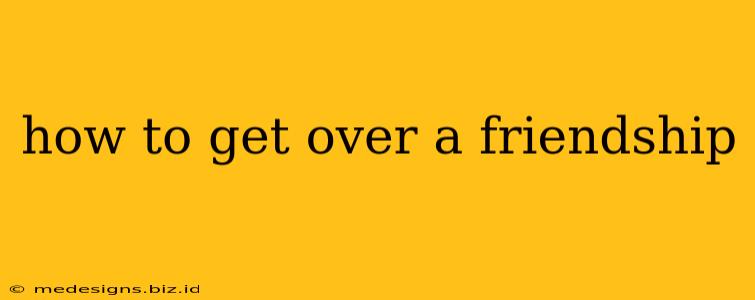Ending a friendship, whether it's a sudden severing of ties or a slow fade-out, can be incredibly painful. It evokes similar feelings to a romantic breakup, leaving you feeling lost, confused, and heartbroken. This comprehensive guide will provide you with practical steps and coping mechanisms to navigate this difficult period and emerge stronger on the other side.
Understanding the Grief Process
Before diving into solutions, it's crucial to acknowledge the grieving process. Just like romantic relationships, friendships require investment, time, and emotional vulnerability. When that connection ends, it's natural to experience a range of emotions, including:
- Denial: Initially, you might refuse to believe the friendship is truly over.
- Anger: Resentment, frustration, and even rage towards your former friend are common.
- Bargaining: You might find yourself trying to rationalize the situation or searching for ways to repair the friendship.
- Depression: Sadness, loneliness, and a sense of loss are expected feelings.
- Acceptance: Eventually, you'll reach a point where you accept the reality of the situation and begin to move on.
Allow yourself to feel these emotions. Suppressing them will only prolong the healing process.
Practical Steps to Getting Over a Friendship
1. Allow Yourself to Grieve:
Don't rush the process. Give yourself permission to feel sad, angry, or confused. Journaling, talking to a trusted friend or family member, or seeking professional support can be incredibly helpful during this time.
2. Reflect on the Relationship:
While it’s important to avoid dwelling on the negative, taking some time for self-reflection can be beneficial. Ask yourself:
- What were the positive aspects of the friendship?
- What were the negative aspects that contributed to the end?
- What could you have done differently? (Focus on self-growth, not blame)
- What did you learn from this experience?
This introspection helps you gain valuable insights and prevents repeating past patterns in future relationships.
3. Limit Contact:
Unfollowing your friend on social media, deleting their number, or avoiding places where you might run into them are crucial steps. Seeing constant reminders of the friendship can hinder your healing. This isn't about being spiteful; it's about protecting your emotional well-being.
4. Focus on Self-Care:
Prioritize activities that nourish your mind, body, and soul. This could include:
- Exercise: Physical activity releases endorphins, which have mood-boosting effects.
- Healthy Diet: Nourishing your body with wholesome foods supports your overall well-being.
- Hobbies: Engage in activities you enjoy, reigniting your passions and interests.
- Meditation/Mindfulness: Practicing mindfulness helps you manage difficult emotions and stay grounded.
- Spending Time with Supportive People: Lean on your loved ones for emotional support.
5. Build New Connections:
While you shouldn't replace the lost friendship immediately, gradually opening yourself up to new connections can be beneficial. Join clubs, volunteer, or participate in activities that align with your interests. This will help you expand your social circle and build new, healthy relationships.
6. Seek Professional Help:
If you're struggling to cope with the loss of the friendship, don't hesitate to seek professional help. A therapist can provide guidance and support as you navigate your emotions and develop coping strategies.
Moving Forward: Lessons Learned and Future Relationships
The end of a friendship, though painful, offers an opportunity for growth and self-discovery. Learn from the experience, focusing on what you can control – your own actions and responses. Use this as a chance to cultivate stronger, healthier relationships in the future, based on mutual respect, trust, and open communication. Remember, you deserve friendships that uplift and support you. Don't be afraid to let go of relationships that are no longer serving you.
